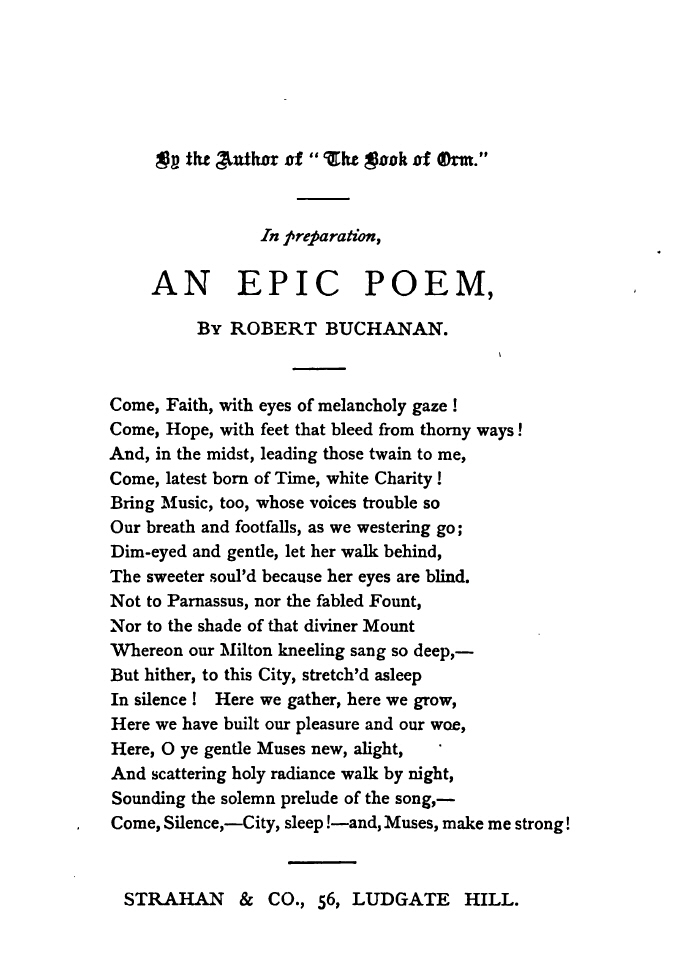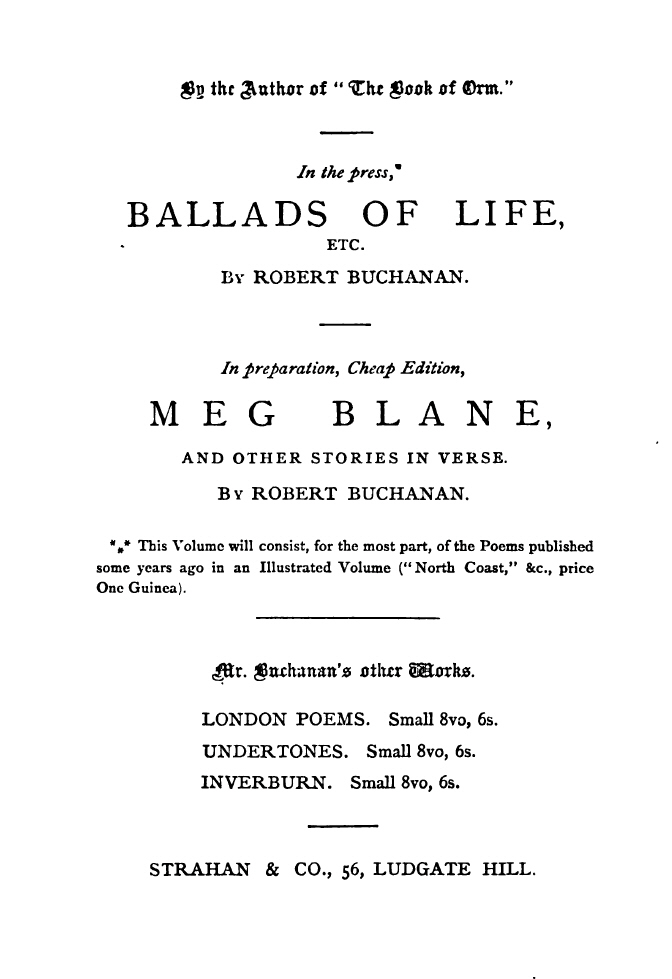ROBERT WILLIAMS BUCHANAN (1841 - 1901)
|
ROBERT WILLIAMS BUCHANAN (1841 - 1901) |
|
|
|
|
|
|
|
|
{The Book of Orm 1870}
207 THE DEVIL’S MYSTICS.
A Scroll Antique, all weed-behung,
[Notes: A scroll antique, with weeds behung,
209 IX. THE DEVIL’S MYSTICS.
THE INSCRIPTION WITHOUT.
The Moral Law: all Evil is Defect;
210 THE TREE OF LIFE.
The Master said: The Master smiled: The Master cried: The Master said: The Master said: The Master cried: The Master smiled; The Master said: The Master smiled:
[Notes:
214 THE SEEDS.
When all that puzzles sense was planned, Shoots of the seed, I saw them grow, Then starry-bright out of the ground Next in His Hand He lifted thus And suddenly! ere I was aware, [5:1] On every grass-blade glittering bright The most was lingering in the least, And deeper still in subtle worth Paler I saw the Master grow, Now the deep murmur of the Earth When standing in the perfect light From all the rest he drew apart, He stood so terrible, so dread, And since that day He hid away And since that day, with cloudy face, O Crown of things, O good and wise,
[Notes:
220 FIRE AND WATER; OR, A VOICE OF THE FLESH.
“Two white arms, a moss pillow, As red as a rose is, I sprang to her, clasp’d her With a ripple of laughter, 221 Down my breast runs the water,
222 SANITAS.
Dreamily, on her milk-white Ass, Who sitteth musing at his door? How pale! how wondrous! she doth pass, [3:1] Brighter, whiter, in the skies, Onward on her milk-white Ass 224
[Notes: THE MAIDEN AND THE LEPER. DOWN the green valley, on her ass, Who sitteth musing at his door? How pale! how wondrous! she doth pass, Brighter, whiter, in the skies, Onward on her milk-white ass
Alterations in the 1884 edition of The Poetical Works of Robert Buchanan:
225 THE PHILOSOPHERS.
We are the Drinkers of Hemlock! We are the Drinkers of Hemlock! We are the Drinkers of Hemlock! 226 We are the Drinkers of Hemlock!
227 PRAYER FROM THE DEEPS.
Father which art in heaven,—not here below;
[Notes:
228 HOMUNCULUS; OR, THE SONG OF DEICIDES.
1. Now all the mystic Lamps that shed
2. Homunculus! Homunculus!
3. It seems but yesterday the dim
4. O had I then so far foreseen,
5. Black is his raiment, top to toe,
6. With Obic Circle he began,
7. He drives the Gods o’ the North to death—
8. Homunculus! Homunculus!
9. Gigantic, in a dark mist, see!
10. Now he hath conquered godhead thus,
11. Silent I wait—(how stand the odds?)
[Notes:
234 ROSES.
“Sad, and sweet, and wise, Weeping low, creeping slow, “I am old,” he thought, By his side the mother came 235 “Swift he came and swift he flew, The Devil gripped the woman’s heart, “Lord God, One in Three! The voice cried out, “Rejoice! rejoice! 236
[Notes:
237 HERMAPHRODITUS.
This is a section of a Singer’s Brain— Cast it back to the grave! Behold him, on the apex of the cone, 238
[Notes:
239 AFTER.
I see, as plain as eyes can see, But, better still, if sadder, I In at the portal, one by one, All round the starry systems stir, Some cannot use their wings at all; If ever in their flight thro’ space Out of the fiery Sun is thrown I see, as plain as eyes can see,
[Notes:
242 HIS PRAYER.
In the time of transfiguration,
[Notes:
243 THE VISION OF THE MAN ACCURST.
How in the end the Judgment dread
[Notes:
245 X. THE VISION OF THE MAN ACCURST.
JUDGMENT was over; all the world redeem’d The wild thing laugh’d Like golden waves The Seraph said: With a voice of most exceeding peace 249 The Waters of Life Then to the Seraph at the Gate, The Seraph said: With a voice of most exceeding peace The Waters of Life, To the Seraph at the Gate, The Seraph said: 252 Then said the Lord, 253 The Seraph heard, And ere the Man could fly, Then said the Lord, “Is the Man there?” and “Yea,” 255 The Seraph, Then the Lord The Lord mused. Still, Then said the Lord: Hushedly, hushedly, “What art thou?” in a stern voice Then said the Lord, Hushedly, hushedly, hushedly, 260 “Have they beheld the Man?” “He lieth like a log in the wild blast, Then said the Lord, Still hushedly The Man wept. And in a voice of most exceeding peace 262
[Notes:
THE END.
______________________________________ |
 |
|||
 |
|||
|
Back to The Book of Orm - Contents or Poetry
|
|
|
|
|
|
|